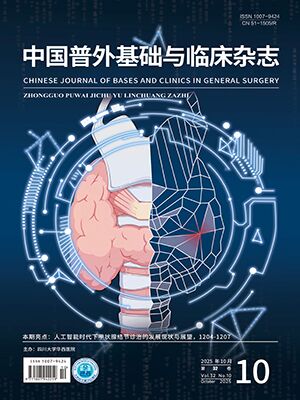| 1. |
Dufay C, Abdelli A, Le Pennec V, et al. Mesenteric tumors: diagnosis and treatment. J Visc Surg, 2012, 149(4): e239-e251. doi: 10.1016/j.jviscsurg.2012.05.005.
|
| 2. |
Gemici K, Buldu İ, Acar T, et al. Management of patients with retroperitoneal tumors and a review of the literature. World J Surg Oncol, 2015, 13: 143. doi: 12957-015-0548-z.
|
| 3. |
Tseng JF, Raut CP, Lee JE, et al. Pancreaticoduodenectomy with vascular resection: margin status and survival duration. J Gastrointest Surg, 2004, 8(8): 935-949.
|
| 4. |
Lai DT, Chu KM, Thompson JF, et al. Islet cell carcinoma treated by induction regional chemotherapy and radical total pancreatectomy with liver revascularization and small bowel autotransplantation. Surgery, 1996, 119(1): 112-114.
|
| 5. |
Tzakis AG, De Faria W, Angelis M, et al. Partial abdominal exenteration, ex vivo resection of a large mesenteric fibroma, and successful orthotopic intestinal autotransplantation. Surgery, 2000, 128(3): 486-489.
|
| 6. |
Lu DS, Reber HA, Krasny RM, et al. Local staging of pancreatic cancer: criteria for unresectability of major vessels as revealed by pancreatic-phase, thin-section helical CT. AJR Am J Roentgenol, 1997, 168(6): 1439-1443.
|
| 7. |
Liang T, Zhang Q, Wu G, et al. Radical resection combined with intestinal autotransplantation for locally advanced pancreatic cancer after neoadjuvant therapy: a report of 36 consecutive cases. Ann Surg, 2023 Jan 24. doi: 10.1097/SLA.0000000000005797.
|
| 8. |
Quintini C, Di Benedetto F, Diago T, et al. Intestinal autotrans-plantation for adenocarcinoma of pancreas involving the mesenteric root: our experience and literature review. Pancreas, 2007, 34(2): 266-268.
|
| 9. |
Tzakis AG, Kato T, Mittal N, et al. Intestinal autotransplantation for the treatment of pathologic lesions at the root of the mesentery. Transplant Proc, 2002, 34(3): 908-909.
|
| 10. |
Tzakis AG, Tryphonopoulos P, De Faria W, et al. Partial abdominal evisceration, ex vivo resection, and intestinal autotransplantation for the treatment of pathologic lesions of the root of the mesentery. J Am Coll Surg, 2003, 197(5): 770-776.
|
| 11. |
吴国生, 梁廷波. 自体小肠移植技术的实践与挑战. 中华消化外科杂志, 2021, 20(1): 85-88.
|
| 12. |
Massironi S, Cavalcoli F, Rausa E, et al. Understanding short bowel syndrome: current status and future perspectives. Dig Liver Dis, 2020, 52(3): 253-261.
|
| 13. |
Pironi L. Definitions of intestinal failure and the short bowel syndrome. Best Pract Res Clin Gastroenterol, 2016, 30(2): 173-185.
|
| 14. |
Nikeghbalian S, Aliakbarian M, Kazemi K, et al. Ex-vivo resection and small-bowel auto-transplantation for the treatment of tumors at the root of the mesentery. Int J Organ Transplant Med, 2014, 5(3): 120-124.
|
| 15. |
Chan DKH, Lee SKF, Ang JJ. Indocyanine green fluorescence angiography decreases the risk of colorectal anastomotic leakage: Systematic review and meta-analysis. Surgery, 2020, 168(6): 1128-1137.
|
| 16. |
Alemanno G, Somigli R, Prosperi P, et al. Combination of diagnostic laparoscopy and intraoperative indocyanine green fluorescence angiography for the early detection of intestinal ischemia not detectable at CT scan. Int J Surg Case Rep, 2016, 26: 77-80.
|




